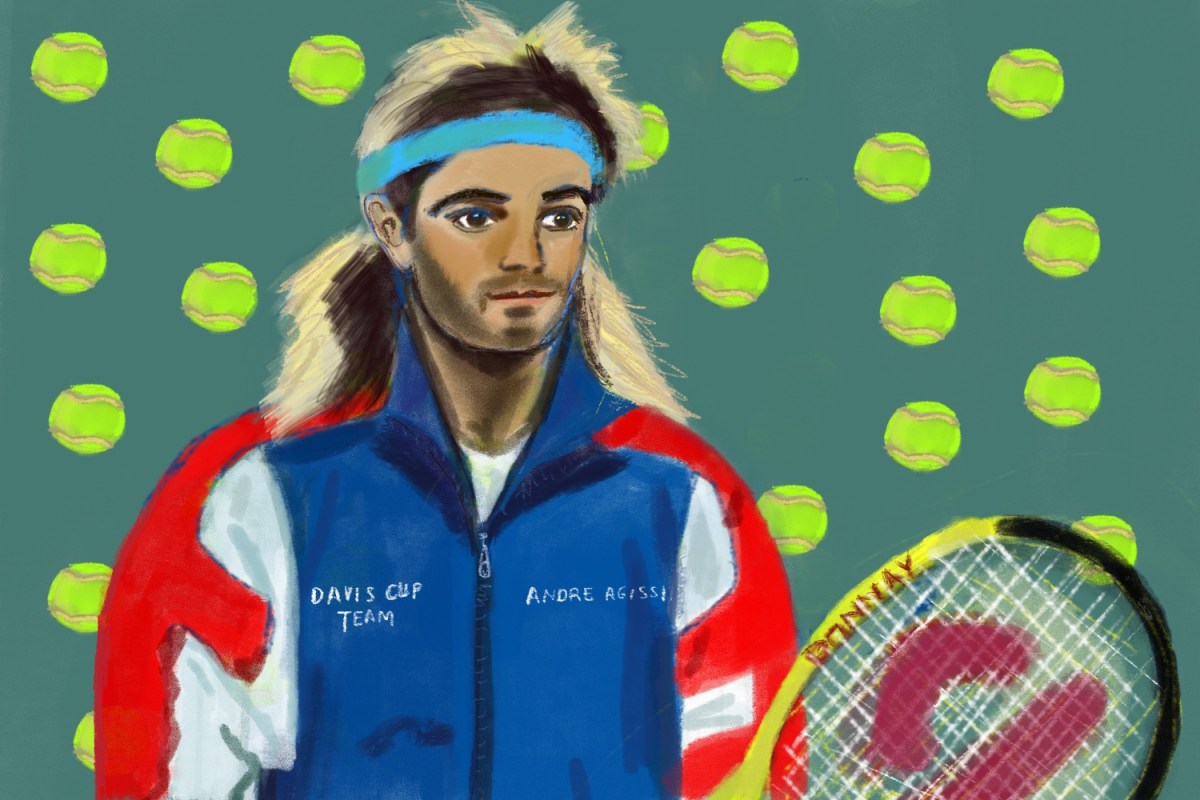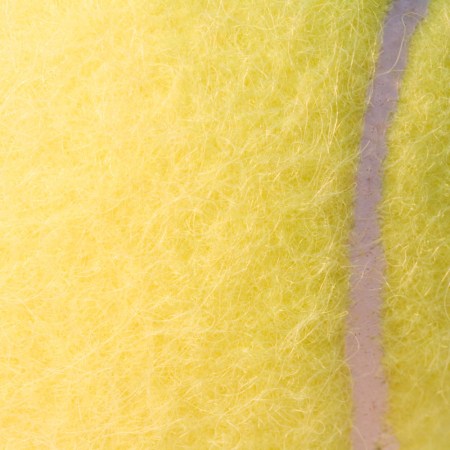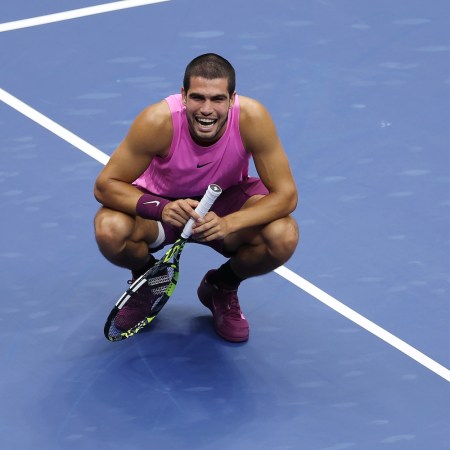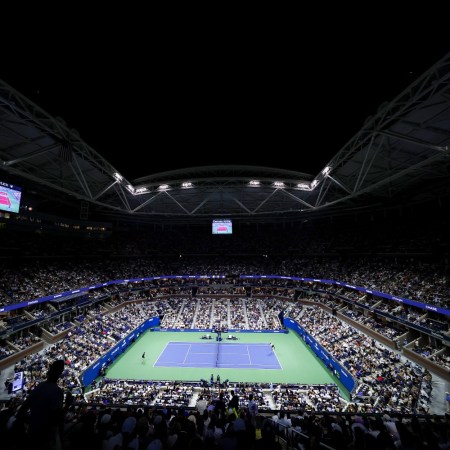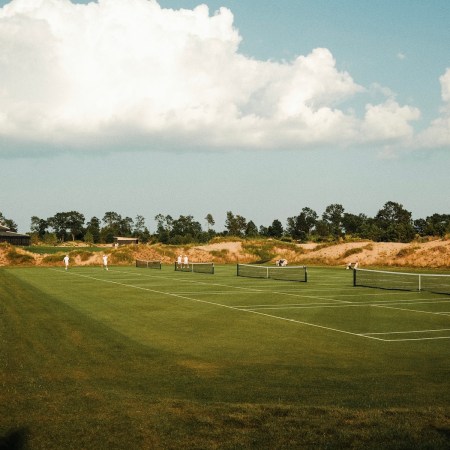Welcome back to “The World According To …”, a series in which we solicit advice from people who are in a position to give it. A professional tennis player since age 16, Andre Agassi is one of only eight men to win a tennis Career Grand slam. He holds an impressive 60 career titles, including eight Grand Slams plus an Olympic gold medal, though his wife’s record is a touch stronger. Agassi is married to Steffi Graf (22 Grand Slams, including the four she notched in 1988, the year she also grabbed gold at the Olympics.) They have two children, Jaden and Jaz. After retiring in 2006, Agassi has spent much of his post-tennis life building the Andre Agassi Foundation for Education and creating Agassi Prep, a school in his hometown of Las Vegas.
Now celebrating its 10th anniversary, his best-selling memoir, Open, is still a must read, even for those who aren’t tennis fans. With a side-eye back toward professional ranks, Agassi is now a coach, formerly advising Novak Djokovic, he currently helps shape the game of Grigor Dimitrov. Agassi talked to InsideHook about tennis, fatherhood and the importance of education while attending the Longines Global Champions Tour in New York in his capacity as the Swiss watchmaker’s Ambassador of Elegance.
Very early in your career, you became a heartthrob and a style icon. Some of your fashion statements were what you called self-exploration and not rebellion. What feelings or ideas have guided your choices when you were crafting that image?
I can’t say I was trying to craft an image. I can just kinda say that anything anti-establishment at the time felt closer to me being authentic. (Laughs) You know, so of sorts it’s a rebellion, right? But it’s also a process. We’re all kind of in that process always so during that stage I was learning a lot about myself but communicating it through a form of rebellion and if you say wear white, I say no, right? And as far as how I dressed, if you said this is a way a player needs to look to play, I just…yeah…
Do you think rebellion and self-exploration are inextricably linked when you’re a teenager or early twenties?
I think it can be an absolute part of somebody’s process. That you need to rebel to understand yourself. I would probably say the reason why it was valuable to me was because I gave myself the permission to value what I felt, right? And so I think that’s an important part of the process to figuring out what you’re not.
And now, many years later, how has your style evolved from acid wash and hot lava?
I kind of like to go under the radar a little bit more these days. I actually got relatively more traditional in the second half of my career, you know, more responsible, more professional, more — more everything. Because I found my reason for playing and once I had ownership of that, it finally was something I wanted to do.
What was your reason to play?
My reason was something I was connected to that was much bigger than me. It was my mission in education. To give children systemic change and systemic change in their life, when they didn’t have a choice. I didn’t have a choice in mine. So kids without choice, in a broken education system, lead to some pretty desperate, desperate things. So when I really made that my mission, tennis became a vehicle for something I really was connected to, and I have a whole different reaction to being out there on the tennis court.
In the opening of your book, you mention that you spent half your life not knowing who you are or where you were. Do you know now where you are and can you tell me who that is? Who and where?
I’m a person in process and accepting of that. I’m not fighting myself anymore. I think the answer to who you are is a hard question because every day you learn more about yourself and you express yourself differently. It’s a lot more about being at peace with your process then it’s about being a destination.
And who do you want to be?
I don’t have any expectation of myself for that. I have goals. I have objectives. I have relational priorities. As a father you want to be everything you can be for you children and whatever their needs are. I mean, it’s spokes on a wheel. I mean, I’m not sure how else to answer that.
You’ve famously said that you hate tennis. Do you still hate tennis even though you’re obviously coaching.
No. I think I was pretty clear, even on page one I said that. I was also clear that the process of me learning myself led to a time in my career I was so thankful to have where I could kind of re-balance that ledger and be on the tennis court with ownership and purpose and appreciation and gratitude. So did I have more times where I loved it than hated it? Probably not. Because I spent longer not liking myself. Hating or loving it is a function of yourself. I’m involved in helping Dimitrov at the moment — he’s a good man and if I can save him ten minutes of what I put myself through, I mean, it’s rewarding, if I can do that.
You’ve won Grand Slams and an Olympic gold medal, what do you consider your greatest success on the court?
On the court, I would say going from number one to 140 in the world. And then climbing back again. Because that’s — that’s hard. The second time is much harder.
Why is the second time harder?
Because you’re always aware of where you’re not. And it’s easier to get discouraged.
And what’s your greatest success off the court?
Getting my wife to say yes. (laughs)
Good answer. Will you ever forgive Jeff Tarango? (Agassi has said Tarango cheated to win a match they played against each other as eight-year olds.)
(Laughs) Forgive, yes. Forget, no. (laughs)
You still just see that picture in your head?
Oh 100 percent. And unfortunately many more pictures of Jeff Tarango but I forgave him a long time ago.
Your relationship with your father was obviously fraught, but what did learn from your dad about fatherhood?
What I didn’t want to be, in a lot of cases. The importance of choice in my children’s lives. And then the discipline of holding them accountable for what they claim they value. So my dad had an intensity on that end. He just told you what you needed to value, so I think choice is a big, big thing I learned from him. The importance of having it and the desperation that can come from not having it.
What you learned from your children about fatherhood?
That I need to learn more than I teach because that is everything and guidance is always knowing where your children are, and why and how. So it’s constant learning. A lot more learning than I ever thought.
How do you make sure love exists in your relationships?
Listen, you can only control yourself. I don’t know if you can control anybody else but for me, you need to reflect what you care about. And I think that if you care about love in your life, then that needs to be prioritized above self.
Getting back to education. Despite dropping out of school in ninth grade, you became a champion for education and learning. Why is that so important?
It changes lives. It doesn’t feel like band aids. You’re giving tools. You’re giving power. You’re giving ownership to a child for a life of their choosing. I feel like with it comes hope, comes possibilities, and opportunity and responsibility and accountability. So I just connected to it because I felt like I was chasing my tail trying to provide other things that children didn’t have.
How has Longines helped?
The have and continue to. Not just resources but, you know, watchmakers coming out to the school, exposing kids to the craft of the watch making. Trips, culture experiences for the kids at my school. Awareness and a platform. They continue to do a lot.
What would you have dedicated your life to if tennis had not worked out?
Well that’s a question you can’t really answer. Because everything you’ve gone through, makes you who you are today and you can kind of look back say well, (given) who I am today, I would probably do this or I would probably do that. But I wouldn’t be who I am today without going through it. So that was always a frustrating part to me, and not having choice…I don’t know what I would have chosen.
Does and did tennis give you something you can’t or couldn’t get anywhere else?
Yes. Tennis gives you immediate feedback. And that immediate feedback can teach you a lot. It tells you the importance of human interaction. It teaches you a lot of things about yourself. You decide something. You get the feedback. You adjust. You problem solve. I feel like many sports are that way but tennis is an exaggerated form of that kind of feedback and you’re constantly put in a position to grow and learn. To make yourself better. To understand your weaknesses. To accept your weaknesses. Recognize your strengths.
Where is the most interesting place you’ve visited and is there anywhere still left you wanna go?
Yeah there are some places I’d like to go. I mean, I’ve never been to Israel. I’ve never been to Alaska. I would enjoy both those places. It’s (Israel) the history of our world. Alaska just from a beauty standpoint. I’ve always talked with my wife about visiting there one day. But, you know, it’s nice when home is a good place to be too.
What’s something that you’ve kept through all of these years?
My necklace that my son made when he was four.
What does it say?
Daddy rocks.
Who was the first person you ever remember admiring who was not related to you?
My trainer of 20, 21 years, professionally, and my children’s Godfather. His name’s Gil.
What do you think the key is to sustaining motivation throughout a long career?
You need your body and you need your mind. So being good to yourself and investing in yourself. You have to invest in your body and you have to protect your mind so just recognizing when you need breaks. Sometimes the best preparation is rest. So I think the balance of mind and body is key.
What’s your worst habit?
Picking my cuticles.
What words do you want on your tombstone?
Um … I told you I was sick.
Well played, sir. You refer to a lot of your rivals as champions and you seem to show quite a bit of respect saying — ‘he’s a champion so I expect him to win, I expect nothing but their best.’ Can you explain that sort high regard for your opponents?
Well it’s not that I expected that, I mean you come to respect somebody for proving that they’re gonna do it. You keep making them have to do it. But you see somebody in competition, you see somebody in their most intense state and when you can respect somebody for their focus or their behaviors in those moments it goes a long way. You’re fighting in front of the world and you’re alone when you’re out there so you know what they’re going through and to watch them do it with dedication and clarity is admirable.
What do you feel is the greatest shot you ever hit?
In a big moment over my left shoulder facing away from the court at the U.S. Open, the second round, the fifth set. It’s actually a pretty hard shot to make against Alex Corretja, actually, so I — that one stands out.
What’s the difference between winning and losing?
Unfortunately it’s a scoreboard on a tennis court. In tennis you have to be better than one person. You don’t have to actually be good. You just gotta figure out how to get over that finish line and what you end up concluding is the most important point is the next one. And so what you end up developing is a muscle that just makes you value every point the same and hopefully, in an ideal world, makes you look at the end and say, “Geez, did I win or did I lose?” But you have to get the most out of yourself and that’s just controlling your controllables. So people that control their controllables better are usually the winners.
The Charge will help you move better, think clearer and stay in the game longer. Subscribe to our wellness newsletter today.
